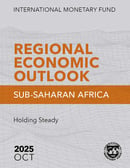This web page presents information about the work of the IMF in Nigeria, including the activities of the IMF Resident Representative Office. Additional information can be found on the Nigeria and IMF country page, including IMF reports and Executive Board documents that deal with Nigeria.
At a Glance
- Current IMF membership: 191 countries
- Date of Nigeria's membership: March 30, 1961
- Special Drawing Rights (SDR): 3730.47 million
- Quota (SDR): 2454.5 million
- Latest Article IV consultation: February 16, 2023
Office Activities
Presentation: Nigeria Recent Developments and Outlook June 2023
Resident Representative, Ari Aisen, delivered this presentation to the Women Corporate Directors (WCD) partners in Nigeria.
June 2, 2023
April 2023 SSA REO Presentation
A presentation made at the Spring 2023 SSA REO launch held in Lagos, Nigeria on May 9, 2023 at the Lagos Business School.
May 9, 2023
Presentation - Nigeria Macroeconomic Developments and Outlook: IMF View
Presentation by Resident Representative, Ari Aisen, to FMDA quarterly event on September 16, 2022.
September 16, 2022
Arise News - Interview with Ari Aisen
Conjunction of Difficulties, Limiting Nigeria's Growth Capabilities - Ari Aisen
June 3, 2022
Mr. Aisen presenting the April 2022 SSA REO in Abuja, Nigeria.
The hybrid event was held at the Transcorp Hilton Abuja and drew 159 people (83 in person and 76 online). Participants included representatives from the government, private sector, banks, academics/students, CSOs, development partners, diplomatic corps, and the media.
May 30, 2022
April 2022 SSA REO: Presentation Event Photos
May 30, 2022
Nigeria and the IMF
No results found. Either there was an error with the web service or there is no data returned by the web service.
IMF Office in Nigeria
IMF Office in Nigeria
Regional Economic Outlook for Sub-Saharan Africa
October 16, 2025

The outlook for Sub-Saharan Africa is showing resilience, despite a challenging external environment with uneven prospects in commodity prices, still tight borrowing conditions, and a deterioration of the global trade and aid landscape.
Read the Report
Fraudulent Scam Emails Using the Name of the IMF
For more information please see Fraudulent Scam Emails Using the Name of the IMF
Departmental Papers on Africa
 The Departmental African Paper Series covers research on sub-Saharan Africa conducted by International Monetary Fund (IMF) staff, particularly on issues of broad regional or cross-country interest. The views expressed in these papers are those of the author(s) and do not necessarily represent the views of the IMF, its Executive Board, or IMF Management.
The Departmental African Paper Series covers research on sub-Saharan Africa conducted by International Monetary Fund (IMF) staff, particularly on issues of broad regional or cross-country interest. The views expressed in these papers are those of the author(s) and do not necessarily represent the views of the IMF, its Executive Board, or IMF Management.



